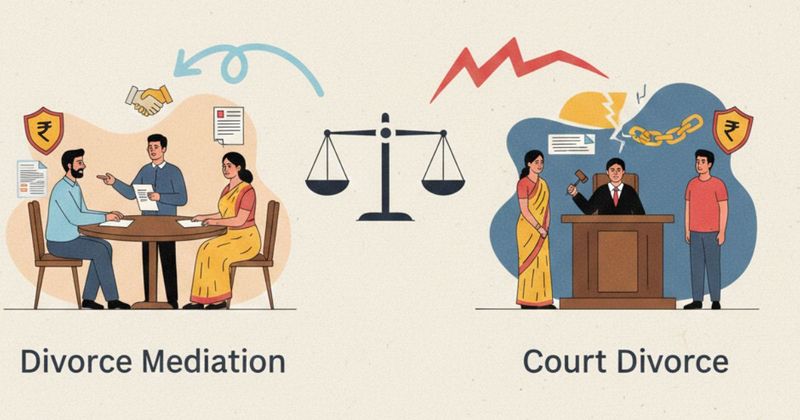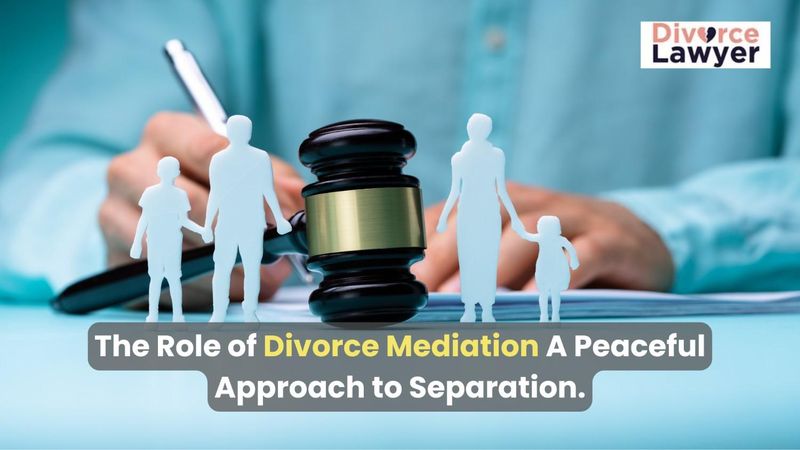Divorce mediation is a method of dispute resolution that encourages communication and cooperation between separating couples has been gaining popularity in India in recent years. Divorce can be a painful and emotionally charged process often involving intense legal battles and disputes. In such a situation divorce mediation emerges as an alternative and peaceful means of resolving marital conflicts.
What is Divorce Mediation?
Divorce mediation offers a structured and voluntary process, utilizing a neutral third party known as a mediator to assist divorcing couples in reaching mutually acceptable agreements to resolve various divorce-related issues. Unlike the traditional court system, this alternative dispute resolution method prioritizes open communication, cooperation, and informed decision-making. Divorce mediation offers divorcing couples a collaborative approach, steering away from the adversarial nature of traditional litigation, aiming for mutually agreeable solutions, and empowering individuals to shape their post-divorce futures with clarity and understanding.
Reasons to Choose Divorce Mediation
There are several compelling reasons to opt for divorce mediation in India:
Cost-Effective: Divorce mediation is often more affordable than litigation, which can be an expensive process. Mediation promotes a cooperative approach, encouraging open communication and problem-solving. It helps preserve a healthier co-parenting relationship, ultimately benefiting the children.
Faster Resolution: Mediation typically takes less time than traditional court proceedings helping couples move on with their lives more swiftly. Court proceedings can be time consuming with cases often dragging on for months or even years. Mediation generally leads to quicker resolutions. Faster resolutions can allow both parties to move on with their lives establish new living arrangements and find closure sooner.
Less Emotional Stress: Mediation can be less emotionally draining than courtroom battles, as it encourages cooperation rather than confrontation. Mediation typically results in less emotional stress for both parties. This can be especially beneficial for those who want to maintain a cordial relationship with their ex-spouse particularly when they will continue to interact as co-parents.
Privacy: Mediation is a private process as opposed to the public nature of court proceedings. Mediation sessions are private, and the details of the discussions typically remain confidential. In contrast, court proceedings are a matter of public record, making personal and sensitive information available to the public. Privacy can be particularly important when there are personal or financial matters that divorcing couples prefer to keep confidential.
Control Over the Outcome: In mediation, couples have more control over the decisions made regarding their future, rather than having a judge impose rulings. They actively participate in negotiations and agreements, rather than having a judge impose decisions upon them.
Customized Solutions: Mediation provides the flexibility to craft customized solutions. The divorcing couple can work together to create agreements that meet their specific needs, including child custody arrangements, property division, and financial support.
Divorce Mediation Process
The divorce mediation process generally follows these key steps:
Initial Consultation: The process begins with an initial consultation with their mediator. This meeting serves to explain the mediation process, the roles of the participants and the expectations. They also encourage open communication and constructive discussions.
Information Gathering: The mediator helps gather all relevant information such as financial documents to ensure informed decision-making. This may include financial records, assets, debts, and any other information necessary to make informed decisions. Full financial disclosure is crucial as it ensures transparency and fairness in the negotiation process.
Discussion and Negotiation: The mediator facilitates discussions, helping the couple reach agreements on issues like child custody, property division, and financial support. With the necessary information in hand, the mediator guides the couple through discussions about various issues that need to be resolved, such as:
- Child Custody: Determining custody arrangements, visitation schedules, and parenting plans that are in the best interests of the children.
- Division of Property and Assets: Equitably dividing marital property, assets, and debts, including real estate, bank accounts, retirement accounts, and other financial matters.
- Spousal Support (Alimony): Addressing issues related to financial support for one of the spouses, based on factors like income, needs, and the length of the marriage.
- Child Support: Establishing agreements regarding child support payments to ensure the financial well-being of the children.
Drafting the Agreement: Once agreements are reached, a formal divorce settlement is drafted, reviewed, and edited as needed. This document outlines the terms and conditions of the divorce including all agreements, responsibilities and obligations of each party. The mediator ensures that the agreement is clear, comprehensive and accurately reflects the decisions made during the mediation sessions.
Review by Lawyer: It’s advisable for each party to have their lawyer review the agreement to ensure it aligns with their interests and the law. Lawyers can provide legal guidance and ensure that the agreement aligns with their client’s legal rights and obligations. They may suggest revisions or seek clarification if they believe the agreement could be improved.
Finalize the Divorce: After any necessary revisions both parties and their lawyers review the final version of the mediated agreement. Once all parties are satisfied with the document, it can be filed with the court. The court will review the agreement and if it complies with legal requirements and is in the best interests of any children involved, it will issue a divorce decree, finalizing the divorce.
Benefits of Divorce Mediation
The advantages of divorce mediation are numerous and include:
Reduced Conflict: Divorce mediation promotes a cooperative approach to resolving disputes. It encourages open communication and problem-solving which is particularly beneficial when there are children involved.
Cost-Effective: Mediation is often less expensive than going through a contentious court battle. Court proceedings can be expensive, with legal fees, court costs, and other expenses accumulating quickly.
Faster Resolution: Cases resolved through mediation are typically quicker than court proceedings. This means that both parties can move on with their lives and establish their new living arrangements.
Customized Solutions: Mediation allows for tailored agreements that address the unique needs of the couple and their children. The divorcing couple can work together to create agreements that meet their specific needs.
Privacy: The details of the discussions typically remain confidential and doesn’t become a matter of public record. In contrast, court proceedings are a matter of public record, potentially exposing personal and sensitive information.
Emphasis on Children: Mediation places a strong emphasis on the well-being of any children involved in the divorce. It encourages decisions that prioritize the best interests of any children involved.
Things to Be Careful with Before Opting for Divorce Mediation
While divorce mediation offers numerous benefits, it’s important to approach it with caution and consider the following:
Voluntary Participation: Both parties should willingly participate in mediation; it cannot be forced upon anyone.
Full Disclosure: Complete financial transparency is crucial. Both parties should provide all necessary financial information for fair and informed decision-making.
Mediator Selection: Choose a qualified, impartial, and experienced mediator who understands the complexities of divorce mediation in India.
Legal Counsel: Even in mediation, it’s advisable for each party to consult with a lawyer to ensure they understand their rights and obligations.
Significance of Divorce Mediation in India
Divorce mediation is really important in India because it gives a peaceful and respectful way for couples to solve problems and end their marriages. Instead of fighting in court, mediation helps people work together, talk openly, and understand each other, making it less stressful for families.
In India, where people value family harmony and friendly divorces, mediation lets couples separate with respect, considering their cultural and religious beliefs. It also allows them to find solutions that fit their needs, like deciding who takes care of the kids, how to share property, and sorting out money matters.
The best part is that mediation is affordable, making it fair for everyone, no matter their financial situation. It keeps things private, respecting the wish to keep family matters secret. Overall, divorce mediation is a great way for people in India to handle the challenges of divorce respectfully, create better relationships as co-parents, and grow individually after their marriage ends.
The Role of Divorce Lawyers
Divorce lawyers play a vital role in the context of divorce mediation particularly when considering the significance of this alternative dispute resolution method. While mediation promotes cooperation and compromise, divorce lawyers provide essential legal expertise to ensure that their clients’ rights and interests are safeguarded throughout the mediation process. They offer valuable advice, ensuring that clients are well-informed about the legal implications of their decisions. Lawyers serve as advocates representing their clients interests and ensuring their voices are heard during mediation sessions. They review and prepare legal documents, making certain that the mediated agreements align with their clients wishes and adhere to legal requirements.
For more information, contact us https://divorcelawyer.in/




